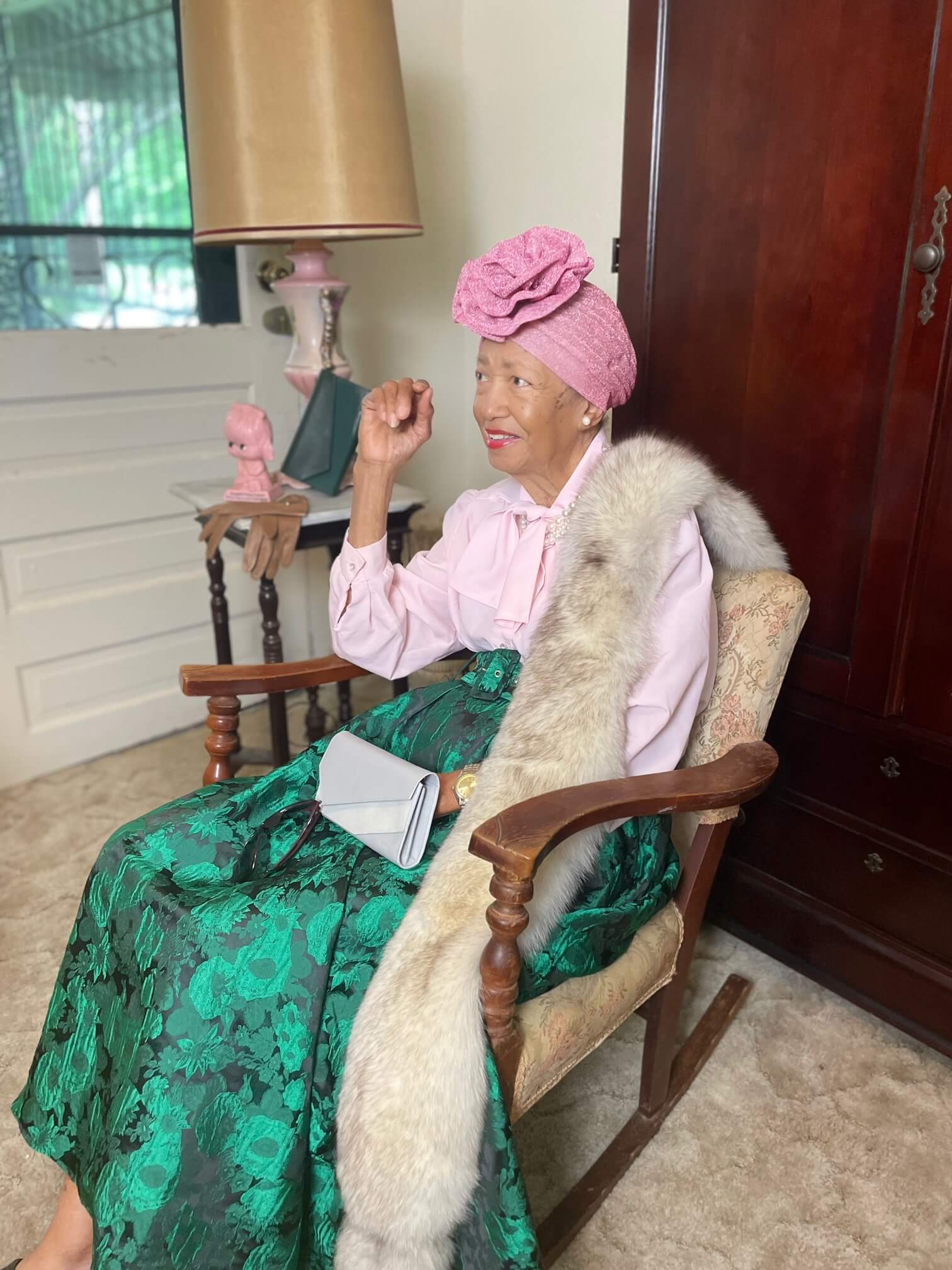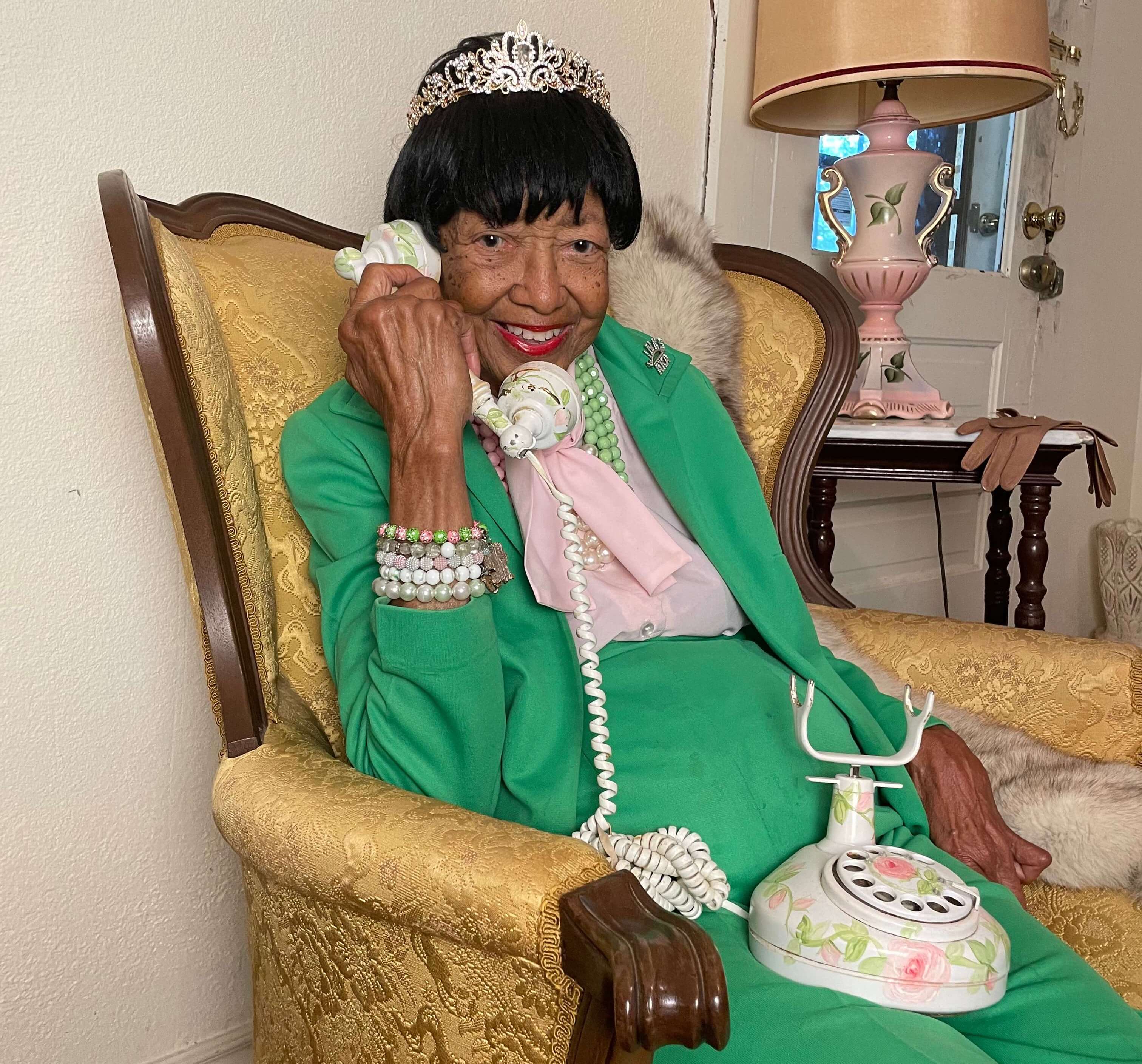08 | Aunt Lil: The Fascinating Things You'll Learn From The Generations Before Us

08 | Aunt Lil: The Fascinating Things You'll Learn From The Generations Before Us
At 89 years young, Aunt Lil is what I call a Modern Trailblazer, with the wit and grit to do anything she sets her mind to. It was such a treat hearing her story and endless determination to reach her ultimate career goal of becoming a Social Worker.
It was also a great privilege to have access to some of my family’s history that traces back to the mid 19th century. It is such an honor to be able to discuss the significance of Juneteenth for my late Great Grandma “Mamma Myrt,” and learn the history of Willow Grove, TX, a community founded by A. W. Crawford and my Great Great Great Great Uncle Buck who sought more opportunity as an ex-slave migrating from the Manning Plantation in Shubuta, MS.
Topics Covered:
- Setting goals and making them a reality
- The draw and determination to become a Social Worker
- Willow Grove, TX familial roots
- The importance of Juneteenth
- Acknowledging the detours in life before reaching your destination

- Setting goals and making them a reality
- The draw and determination to become a Social Worker
- Willow Grove, TX familial roots
- The importance of Juneteenth
- Acknowledging the detours in life before reaching your destination
Explore Our Podcast
Transcript
Aunt Lil: So the most historical event in her life was the day that she heard that she was free. And my mother remembered her because she always said that she shouted all day long. Free at last. Free at last. Thank God Almighty I'm free at last. And she said that she just shouted all day long the day she learned that she was free.
These were my great grandmother's words. And her name was Laura Bookman.
Stephanie: I am Stephanie Evans, and this is Diaries of a Modern Trailblazer. Take note of the journey and be inspired to forge your own amazing path.
Thank you Aunt Lil for taking the time to be part of this podcast. I love how you've been so open and excited about sharing your time, a bit of our family's history and your story, even though you don't know much about what a podcast is yet. I'm fortunate to have a seat at the table with you. Somebody who I call like our family's historian.
Tell us a bit about who you are and your background.
Aunt Lil: My name is Lillian Dorothy Manning. I'm the youngest child of my parents Authur James Manning and Myrtle Holmes Manning. There were 12 of us in our family. I'm the youngest of 12, and I grew up since age nine, in this house come December the 20th of this year.
This has been our family home for 80 years, and except for when I was away in school away one year, I lived out on Long Island in New York, but except for being in school, this has always been my home.
As I said early on, we moved here when I was nine and I was in third grade at South Waco Elementary School, and from that point on, I went into Moore High School, graduated in May of 1953, and would you know that our class was called the tornado class, because that was the year of the severe tornado in Waco, which occurred on May 11th, 1953. And as the news recorded, there were 114 people lost their lives. So following graduation, guess what?
Stephanie: What?
Aunt Lil: Guess where I was on June the 6th, 1953. I was at your mother's and your aunt's first birthday party.
Stephanie: Wow.
Aunt Lil: Did I ever tell you that?
Stephanie: I know you were at one of their birthday parties when they were very young
Aunt Lil: When, but when they were one year old, I was at their birthday party because I had gone after I had graduated from high school, I had gone to St. Paul for the summer and got a job at Frank Murphy's department, ladies ready to wear a shop. And I worked there until, I guess around September 1st in
Stephanie: That was in Minnesota?
Aunt Lil: Uhhuh in St. Paul.
Stephanie: Cool.
Aunt Lil: But anyway so that following September I enrolled at Texas Southern University as a freshman. Then following graduation that September, or rather in October, I got hired by our Board of Missions of the Methodist Church, and my assignment was in the coal fields of West Virginia.
So I stayed there from 1957 until 1960, and I was raring to go to graduate school so that I could get my master's in social work. As it turned out, I got a scholarship to Scarritt College for Christian Workers, which was our Methodist church school, but they did not have the master's degree in social work. They had a master's degree in community work. That really wasn't what I wanted, so I stayed there for one year and I was still, my goal was to still get an MSW.
Through the channels of working and trying to see what uh, set my goals, I ended up returning home, right? Right here we would, my parents were still living in this house, so I returned.
That was in 1963. I returned here, home to Waco. And believe it or not, I enrolled at Paul Quinn College to get my teaching certificate because it just seemed I don't know if I'm gonna ever get my MSW, so I'll just, I'll get a teaching certificate and I can teach.
So I went to Paul Quinn that one semester and received a teaching certificate. So that's why every time there's something going on with Paul Quinn, I still brag about my having gone to Paul Quinn, just as though if I had received a PhD from Paul Quinn, because I think Paul Quinn is very important.
It was important back then. It's important today, even though they have moved to Dallas. By the way, my dad attended Paul Quinn College, and my oldest sister attended Paul Quinn College Rosetta, who is now looking toward her 103rd birthday come July. So I had my dad, my oldest sister, and Sarah, another sister who finished Paul Quinn and taught here in Waco for 30 years, and then my brother Reuben, who had graduated from high school Moore High, went into the military, came out, went on to get his doctoral degree, and he ended up as President of Paul Quinn College. So when you say Paul Quinn College, to me, that rings a very important bell because I just revere and will always revere and respect Paul Quinn College.
Stephanie: Yeah. And I didn't know that about your father.
Aunt Lil: He went to Paul Quinn. I don't have the year and I have talked to the librarian since they have relocated to Dallas and asked her where can I find some data that would reflect a term paper he turned in, or the day he was admitted. Just some,
Stephanie: yeah like a student log or something to indicate the timing
Aunt Lil: that would indicate that he was there. I wish I could. But anyway it was during the time following when school was out that spring and I had gotten my master's, my teaching certificate, I still wasn't so satisfied because I still wanted to get my master's degree in social work.
So I applied to the University of Texas and guess what? At that time, the GRE graduate record exam was required.
Stephanie: I even took the GRE
Aunt Lil: record exam and the minimum requirement was 1000. And guess what? I made 937 and that threw me out. I couldn't go. I didn't make, I didn't make a thousand.
So they were, saying you tried, but it didn't work. Anyway, I I got a job still not teaching, even though I'd gotten the teaching certificate from Paul, at Paul Quinn. I got a job working at Huston Tillotson, which is now Huston-Tillotson University, but in 1963 it was Huston-Tillotson College.
I got a job as the as assistant counselor of women, which was equivalent on most campuses as the Assistant Dean of Women. So I worked there, and while I was there I met a Methodist Deaconess. She had been assigned to work at Huston-Tillotson College.
So from time to time we would meet and talk and share our Methodist relationship. And I suppose at some point in time we talked about my still wanting to get my master's degree in social work. And guess what she said? Why don't you try Atlanta University that is an all black college and see what happens?
I told her that I had applied at the University of Texas, but my G R E was not high enough. And she suggested that I try Atlanta University.
And I did. I applied and within the purview of their evaluating what they saw on my transcript, I got accepted. However, they told me with within one of the communications that there were no more scholarships available. But come on, if, if you have your own money, fine, we'll meet you at the door. Just come on in. And of course, I did not have college money.
Guess what? I got a phone call. It was the dean from the Atlanta University, saying that they had one more scholarship available and what had happened, the reason they had that scholarship was because the student that they had given it to had changed her mind, and they immediately called me and said, you can have it if you want it. We got one more. And it's because this other student turned hers, turned it back in, and I said yes.
Stephanie: Yeah. That's amazing.
Aunt Lil: I could still be saying yes. Even today. Because I was so grateful and I was grateful to God that this had happened, that he had made a way for me.
And I left on September 12th, 1965, going to Atlanta and I arrived and was getting, got into the dormitory and all of that. And one of the things that I'll always remember as we were gathering, all the students were gathering in the dormitory, and we were getting to talk about where we were from, somebody was from Dallas and Houston, and somewhere from upstate New York or Pennsylvania or Ohio or wherever, we were all telling where we were from. And so doing, the students were talking about my flight I flew here. I flew here on Delta. I flew on American Airlines. I flew on Southwest. I flew on the, they were naming off all these different airlines that they had flown to Atlanta on.
And then, they knew that I had come from Waco, Texas. And so they were asking me how is your flight down? And I had to I came on a Greyhound Bus. And not that I was embarrassed, but it just sound like that they were so sophisticated, having flown down to Atlanta. And poor me, I just didn't. Make it on the Greyhound bus.
But I made it.
Stephanie: Yeah, you made it.
Aunt Lil: That's the key to it. That's what...
Stephanie: exactly!
Aunt Lil: we said. It's not how you got there, but you got there.
But the commencement, I'll have to tell you about the commencement. As we were required to turn in certain written assignments and certain this, and, working on different things.
When I turned in my thesis, of course I turned it in prayerfully, hoping that it got approved and all of that. As the thesis were being approved, our names went on the bulletin board in the lobby at the school of social work building. So every day we would go look at the board, whose name is on there, whose name is on there, have they put your John Jones and Mary Smith, and all these names up there.
So I looked up there and I didn't see my name. I go again, I didn't see my name. May 6th 1968, my name went up saying that I was on the approval list for graduation. I had been approved for graduation on the 6th of May, 1968, and commencement was scheduled for June 3rd, 1968, so June 3rd, 1968, my name was called when the School of Social Work Department stood to get their degrees.
You talk about your journey towards getting that degree, that master's degree in social work. What initially made you want to become a social worker?
At my high school here, Moore High School, we had what was known as vocational day. People from the community would come and talk to you whatever field,
Stephanie: Like a career day.
Aunt Lil: Career day, yeah. Okay. Yeah. Career day. We had career day at our high school. And people were there teachers were there. Would you like to become a teacher? Would you like to become a doctor? What do you wanna be a dentist? You wanna be this and you wanna do this, and you wanna be this and you wanna do that?
My math teacher, who by the way, had gone to the University of Minnesota and because he was from Waco here and he met up with your mom. And, everything else is history as they say, but,
Stephanie: Are you talking about my grandma
Aunt Lil: Yeah, your grand. Yeah. Your grandmother. I'm talking Yeah. Uhhuh. So anyway he knew me through them. He knew that I was their little sister.
Stephanie: Yeah.
Aunt Lil: And so , the lady who came, I believe as a social worker that talked to us about social work, worked out here at the Waco VA. I believe that's who that person was. But anyway, he told me, he said, go in that room. They're talking about social work. He said, I believe you would make a good social worker.
And he was my math teacher. Which is a thousand miles from social work.
Stephanie: Yeah.
Aunt Lil: But anyway, he told me to go in that room. They were talking about becoming a social worker, and I did. And I don't know, I just said yeah, that sounds interesting. I think I will. And I, but I'm trying to think, what grade was I in?
I wasn't a senior in high school. Oh. I don't even remember what grade I was in. But anyway, I followed that dream, so to speak. So that when I graduated from high school and went to Texas Southern, they didn't have social work per se, so I took sociology. I got my bachelor's degree in sociology, which was not social work.
What is sociology, when you getting ready to get a job?
Stephanie: Yeah. Valid point.
Aunt Lil: So that, that's what happened. That made me even, I just had the bachelor's in sociology, but I knew down the road and up the road, someday I was gonna have to get a degree in social work to become a social worker.
Stephanie: Yeah.
Aunt Lil: So from the time that I did graduate from high school in 1953. Help me do the math to 68. How many years is that? Is that 15? 15, right. Three from eight,
Stephanie: yeah. 15.
Aunt Lil: Yeah. 15. 15 years later I got my master's degree in social work.
Stephanie: I know a lot of social workers. Yeah. My mom, aunt, and then my childhood best friend, she's actually working on her master's degree for social work.
Aunt Lil: And then while I was working here at the VA before I retired I talked to another girlfriend who worked during the day and she drove to U T A Arlington.
And got her doctorate and she tried to encourage oh no, that, that's too much trouble. I you have to go, because she was taking classes at night after she got off from work. Like from six to nine, and then you got to drive back from Arlington to Waco and then get up the next morning and go to work.
And I said, I don't uhuh that, that's not me. I don't want to do that. Yeah. And I think the rationale for it, the reason for it is because my job did not require a doctoral degree. Had I been in education, teaching at a college or something like that, yes, I could see maybe going further to get a doctoral degree. But the job that I had as a social worker here at the Waco VA Hospital did not require a doctoral degree. So I didn't follow through on it.
Stephanie: Yeah.
Aunt Lil: And the lady that was doing the she taught said she taught it Paul Quinn.
Stephanie: Yeah, that makes sense.
Aunt Lil: And then I think that's why that was, yeah.
Stephanie: There's an area in Texas that's deeply rooted in our family history. Can you share more about Willow Grove?
Aunt Lil: Yes, I can. And I am delighted to. According to the most recent history, The Willow Grove community was founded by my great-great uncle, which would be your great uncle William Manning, affectionately called Uncle Buck.
Stephanie: He'd be like my great.
Aunt Lil: Yeah, I think there are four greats.
Stephanie: Yeah, four greats.
Aunt Lil: Uncle William Manning affectionately called Uncle Buck by all whether related or not.
According to historical data, Uncle Buck and several of his relatives, including my grandfather, who was only eight years old, left the Manning plantation in Shubuta Mississippi, and headed to Texas in a covered wagon. The trip was not easy to say the least. However, they arrived in Texas and one baby was born on the Texas, Louisiana border. Her mother named her Texana because of where she was born.
Of course, there were many ups and downs as the ex slaves traveled and made decisions where to settle . Upon arrival in Valley Mills, Texas, which is outside of Waco, Uncle Buck wanted to buy land and settle somewhere in that area. Uncle Buck had met a gentleman by the name of Andrew W Crawford, who like Uncle Buck had been fathered by a white slave master. As the story unfolds, the two gentlemen put their heads together, and because of his color, Andrew Crawford was able to purchase 320 acres of farmland in Willow Grove, which was paid for by Uncle Buck. The owner would not sell the land directly to Uncle Buck because of his color. And to really seal the contract, Andrew Crawford later married Uncle Buck's sister, whom we all called her so lovingly, Aunt Harriet.
This plott of land was considered prime farmland, and many of the settlers who came from Shubuta bought various plots of land, thus the Renaissance of Willow Grove community.
My father, Arthur James Manning, who is your great grandfather was the first son and first child born to Rueben and Mentha Eaves Manning born October the 27th, 1878 was the first child born at Willow Grove. And since that time, all others who were born, grew up, lived in the Willow Grove community have really felt that the family connection is what Willow Grove is all about. From the 320 acres of land purchased, Uncle Buck donated one acre of land for the Willow Grove Baptist Church, one acre of land for the Willow Grove Elementary School, and one acre for the Willow Grove Cemetery.
Have you been to Willow Grove?
Stephanie: I don't think so.
Aunt Lil: You got to go. You gotta,
Stephanie: yeah
Aunt Lil: you gotta go.
Stephanie: I have to
Aunt Lil: You gotta go.
The Willow Grove Cemetery Association was founded in 1935. I was one year old and it is still active and alive today with active members.
And you are remember!
Stephanie: Yeah.
Aunt Lil: It is still active and alive today. With an active Willow Grove Cemetery Association Board of Directors, which meets regularly to discuss and handle all matters pertaining to burials, the upkeep of the cemetery and the perpetual fund to keep the cemetery cared for in years to come.
Okay that's Willow Grove. You have any other further questions?
Stephanie: No, not on Willow Grove. Just given our family's history and us being descendants of slaves here in America, what does Juneteenth mean to you?
Aunt Lil: Juneteenth is very important to me. I've always recognized it, and wanted to celebrate. In fact, I now again, I can go back to Willow Grove because every 19th of June on the church grounds, we always had a special day, a picnic day or whatever.
And I believe also that may have been a cleanup cemetery date too, if I remember correctly. But I know we always had something at the church and...
Stephanie: growing up?
Aunt Lil: Yes. That's how, that's what I said between the 1935 and the 1941. These are the years that I'm talking about.
Stephanie: Yeah.
Aunt Lil: And I remember he was our cousin.
He, but his wife was really our cousin, so we called him cousin too. Cousin Caleb. We always had down what they called it down on the grounds. The families would cook, would bring fried chicken and cake and potato salad and stuff up to the church, and we would eat and we'd have back then and there.
Are you familiar with the term soda water?
Stephanie: Yes.
Aunt Lil: Okay. Cousin Caleb had a tub and he would put ice in it and he'd put soda water in the tub. And as children, I can remember, if you wanted a bottle of soda water—— you good? And what flavor do you want, baby? I want what we said strawberry back then. Big Red or whatever. That's what I liked. And so he would give us a bottle of soda water. I don't think we had to pay for it. I think it was the food was free. And we'd get a bottle of soda water to eat with our food, and the children would play games, and we'd see people. And it was just like a family picnic. But on the church grounds. And that's how we, we would celebrate, the 19th June out there.
But now going back historically, the most historical event in my great-grandmother's vice, which would've been Ethel's great-grandmother. Okay, now you take it from there. If she was Ethel's great-grandmother, then what Ken would she be to you?
But anyway
Stephanie: She'd be my great-great-great-grandmother.
Aunt Lil: Okay. So the most historical event in her life was the day that she heard that she was free. And my mother remembered her because she always said that she shouted all day long. Free at last. Free at last. Thank God Almighty I'm free at last. And she said that she just shouted all day long the day she learned that she was free. That's what she
Stephanie: So that was, that was Mamma Myrt's grandmother?
Aunt Lil: Yeah. Her grandmother. These were my great grandmother's words. And her name was Laura Bookman, who lived in Grimes County and Grimes County is out from Houston, near Huntsville and down in
Stephanie: Okay
Aunt Lil: that way somewhere.
Do you know where Grimes County is?
Stephanie: Never heard of Grimes County until today.
Aunt Lil: That's where mama was from. Mama was born in Grimes County and all down in there. We have a church and it might be gone now, but it's called David's Chapel Methodist Church. And that's at Shiro. Shiro is somewhere in the Huntsville area, I think.
But going to, all of that's going towards Houston.
Stephanie: Okay.
Aunt Lil: So sometimes, like we always say, it tickles me sometimes when you talking with a person, they say if you don't have anything else to do. If you don't have anything else to do, you can, come to church Sunday. So I'm, so if you don't have anything else to do, look up and see if you can find anything called Shiro.
Shiro Cemetery and David's Chapel Methodist Church.
Stephanie: Okay.
Aunt Lil: It might be all gone now. But that's where a lot of mama's kin folks are buried, at that cemetery.
Now, getting back to the Juneteenth. Juneteenth was always important to my mom, and she always wanted to go to Mexia, to the celebration in the community commemorating Juneteenth.
Stephanie: And where's Mexia?
Aunt Lil: Huh?
Stephanie: Where's Mexia? Is that nearby?
Aunt Lil: Mexia is in Limestone County on Highway 84.
No, you're talking about a lot of stuff. I don't know. I don't really know much.
If you keep highway 84 uhhuh. I was here, here in wa. Okay. You pick up eight, I think it's 39 miles or something like that to Mexia.
Stephanie: Okay.
Aunt Lil: But Mexia is where mama has a lot of kin folks and stuff there.
Juneteenth was always important to my mom as she always wanted to go to Mexia, to the celebration in commemorating the Juneteenth and what it meant to black people.
As I recall, she stated in her early years she had lived in a small rural community called Cedar. One time when Richard was here, we went through Mexia and all that and we saw Cedar, it's little stop in the road.
So that's where they lived in Cedar, when she was, I think she was five. Yeah. And a small rural community called Cedar in Limestone County. Her family had moved there when she was five years old, and every year as a child, her family had gone to Comanche.
And that's, that was a big grounds of celebration, where they celebrated the 19th of June, they had a religious service and a preacher would preach and people would bring food to eat and talk and, communicate, and just enjoyed themselves for this Juneteenth celebration. So she had gone there for many years, but after becoming grown and married and moving to McClellan County, she rejoiced in celebrating Juneteenth wherever she lived, and thought that all black folk should celebrate the same.
When I graduated from Atlanta and got hired to work out here at the Waco VA Hospital, I got hired, I started to work on June the 17th, which was two days away from the 19th of June. And so the morning of the 19th of June, she asked me could I take her to the 19th of June celebration at Mexia.
And I told her well, that I had only been at work two days, so I couldn't take off.
Stephanie: Yeah.
Aunt Lil: But she was, I think she got AJ to take her. You remember AJ?
Stephanie: Yep.
Aunt Lil: Yeah. Uhhuh. So I think she got him to take her. But anyway, she always wanted to go to the Juneteenth celebration at Comanche.
Cause this is where she would run into people that she knew as a child when she lived at Cedar and they would come to town to Mexia and that's what they call, come into town to get groceries and buy clothes or whatever.
Stephanie: Yeah.
Aunt Lil: But she enjoyed celebrating the 19th of June.
Stephanie: Yeah. I've celebrated Juneteenth growing up as a child, being in Galveston County.
Aunt Lil: Yeah. Now that's where I want to go because last year LA LaRay Brenda's son went down. And somebody else from here. Oh, some old cousins from Willow Grove. They went down to Galveston and one of my sorrors went down to Galveston.
They got a big to-do down there, but I've never gone.
Stephanie: Yeah. I mean it's interesting because now Juneteenth is a national holiday. Yeah. And that. That was not a thing what, maybe three years ago? So it, it's great that it is a widespread national holiday that people do know about and actually celebrate.
And it was something that, we would celebrate locally down here in Texas. But. Yeah, I just, I thought it would be great to just share some of the history around our family, because we are here in Texas and have so much history around it.
Aunt Lil: Now, one of the other places where we used to live right outside of called South Bosque, they would give us a sheep to eat.
But yeah, we they wrecked up the white, we were tenant farmers what we call tenant farmers. And they would, they recognized that this was one of our, supposed to be famous holidays, so they would always didn't want my dad to work and my brother AJ and them to work that day.
And so they were nice about giving us the was it a sheep, a goat, a sheep, that we supposed to be eating. And yeah, they always wanted us to be off.
Stephanie: That's nice.
Aunt Lil: Yeah. The 19th. Are they going to, I know, like you say, they it's important. So they're look really looking for a big to-do thing this year down at Galveston.
Stephanie: I don't know.
Aunt Lil: Oh, okay. Okay.
I wanna go to one.
Stephanie: This would be my first year being down here around, I was in Texas in 2020, but that was covid.
Aunt Lil: Yeah. No, I,
Stephanie: and nobody was doing anything. Not really.
Aunt Lil: It seems like to me, what are they? We are having something in the sorority on that day. I've forgotten that but I'm not, they don't say I'm not on program. So I'm, if I can get hooked up with somebody I may come down and see what's going on in Galveston.
Because I've heard them talk about, how it's really a big deal down there.
Stephanie: Yeah.
Aunt Lil: It's almost as big a deal as they, they had the, like I said, up here in Mexia at Comanche. That was a big deal. It's called the Booker T, but really, we call it Comanche. But I think the national name is the Booker T Washington National Park.
That's where it's held. But they call it Comanche. This is where my mom met her partner. It wasn't my daddy, but her first husband. The Alexander man. She met him and he was from Mart. Have you ever heard of Mart? M-A-R-T.
Stephanie: No.
Aunt Lil: It's right down the road here too from Waco.
Stephanie: Oh, okay.
Aunt Lil: But it's still in McClenan County rather than Mexia.
Yes indeed.
Stephanie: Yeah.
Thank you for sharing that bit of history with us. And I just wanna go back to your story and just, reflect on where you are now. So what's your motto?
Aunt Lil: I believe in God. I have faith in God. And I trust in God in everything that I do, regardless of where I'm going or what I'm doing here and there. It's those three things.
Like you say, the Father, Son, and the Holy Ghost. Those are the three that I live by.
Stephanie: What's your proudest accomplishment?
Aunt Lil: My proudest accomplishment would be, to have received my master's degree in social work because it didn't come easy. I didn't just pick it up by the side road. Like I said I went to Scarritt thinking that, I was, but they didn't have an MSW. They had a Master's in social work— a masters in, no, what was it called?
Anyway, they didn't have the MSW. So I just said, no, I got to go somewhere and get an MSW. And then when I did receive, as I said, my greatest accomplishment was when I saw my name May 6th, 1968, that I had completed all of the requirements for the degree.
And my name went up on the board. That's what everybody did. Your name on the board today? Your name on the board? Your name on the board? When I saw my name on the board, my thesis had been approved and I had been cleared I guess that's a good word for it. I had been cleared for commencement for graduation.
And then I graduated. And then the other good thing about it was that I didn't have to go to Timbuktu. I didn't have to go back to St. Paul. I didn't have to go to get a job. I got a job right here in Waco at the VA.
Because the other thing that happened while I was up in West Virginia working, Sarah called me one night and said that the doctor said that my daddy wasn't gonna live till the next morning. And then you see you have to scrounge around and have to... Do you have enough money to fly home? Do you have? You just got to stop what you're doing and fly home right quick. So that was why I wanted to really get here to Waco.
Stephanie: Yeah. I was gonna ask.
Aunt Lil: Yeah, because I had got... Somebody... Oh yeah— opening. Where was it in? It was a place in Connecticut. No, I said I'll get up there in Connecticut and get a call saying my mom was sick and, whatever. And I got to fly home right quick and— no I can't handle that.
And then there was another place up in Battle Creek, Michigan, I think, or somewhere. Oh, they got a job up there. They got an opening up there. But no Uhuh. Cause I didn't wanna have to be way off, out of state somewhere and have to fly home because of illness. So I said, no, I'm gonna go home. If anything happens, then I'll be right there.
Stephanie: Yeah. Proximity. It's good.
Aunt Lil: Yeah. That was the rationale why I was glad that I got hired out here to Waco VA.
Stephanie: And you had a lot of experiences outside of Texas for sure.
In hindsight what advice would you tell the younger version of yourself?
Aunt Lil: Put God first and do set some goals.
And the one thing you can set a goals. Say, I want this and I want this, and I wanna do this, and I wanna do that, and I wanna do that. You may not be able to do all of that, but the important thing is you may have to detour. Sometimes that happens. I want this over here, and you're right there, but before you can get here, you may have to detour and it might take years, but if you really want that, you just, just persevere.
And make sure that God wants that for you too. I, oh, I want... But God might say, Uhuh, no, you don't need to go there. This is what, this is where I want you to go over here. Instead of you wanna go that way and you want over there. But this is what I want for you.
Stephanie: Yeah.
Aunt Lil: That, that happens sometimes.
Stephanie: Yeah, indeed. For sure.
Thank you Aunt Lil for your time. Thank you for sharing our family's history. And I learned a lot about your upbringing and the drive to become a social worker. That was really interesting.
Thank you so much.
And that's a wrap. So own it and make moves one day. I wanna share your journey on this podcast.















